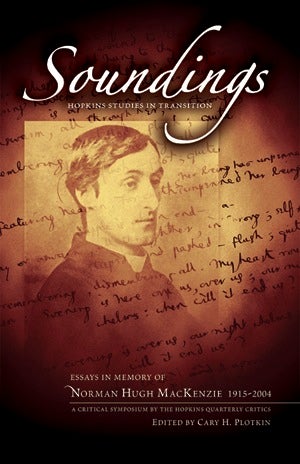
Soundings; - Hopkins Studies in Transition
Price: $38.00
Place Published: Philadelphia
Publisher: Saint Joseph's University Press
Date Published: 2007
ISBN: 9780916101565
Book ID: 37
Description:
194 oages + preface | 8.75 x 5.75 inches
Sixty years ago the "Kenyon Critics" published their influential volume and the first of W.H. Gardner's two-part study appeared. Since then Hopkins scholarship has occupied a small, distinguished, but not always typical position in an age of criticism that has yet to see its term.
Norman H. MacKenzie, to whose work these essays pay memorial homage, set a standard of scholarly rigor and editorial achievement that have influenced every student of Hopkins. His collegial generosity has touched not a few. But if textual scholarship forms the comparatively quiet center of activity around every major author, the literary-critical method, practice, theory, and, latterly, politics have made the last sixty years unusually fertile, changeable, and… prickly. Hopkins scholarship has been atypical. Though deeply influenced, especially in the United States, by the then-contemporary New Criticism, work on Hopkins followed courses too numerous to list briefly but by and large against or across the grain of critical fashions.
These twelve essays, from seven countries and four continents, exemplify Hopkins criticism sixty years on. Where does it stand today? Where does it innovate and suggest new bearings? Which approaches continue to bring forth new fruit? What have we learnt? In what ways do we know Hopkins, his world, his work?
Cary H. Plotkin, ed.
CRITICAL ACCLAIM
"Soundings: Hopkins Studies in Transition acknowledges the passing of the era of Norman Hugh MacKenzie (1915-2004), in whose memory this collection of essays has been published. […] The production values of this book are high, and the editing is good. […] I intend to assign this book to my next graduate seminar on Hopkins, not only because it offers a range of insightful arguments about his work with intense points of illuminating analysis about particular interpretative cruces, and not only because many of the essays successfully attend to the Hopkinsian merging of form and content that make him a great poet, but because it captures a moment in literary history. The contributing scholars are among the leading experts on Hopkins today, and many of them are hard at work in other arenas of Hopkins studies."
Emily Taylor Merriman, Hopkins Quarterly



